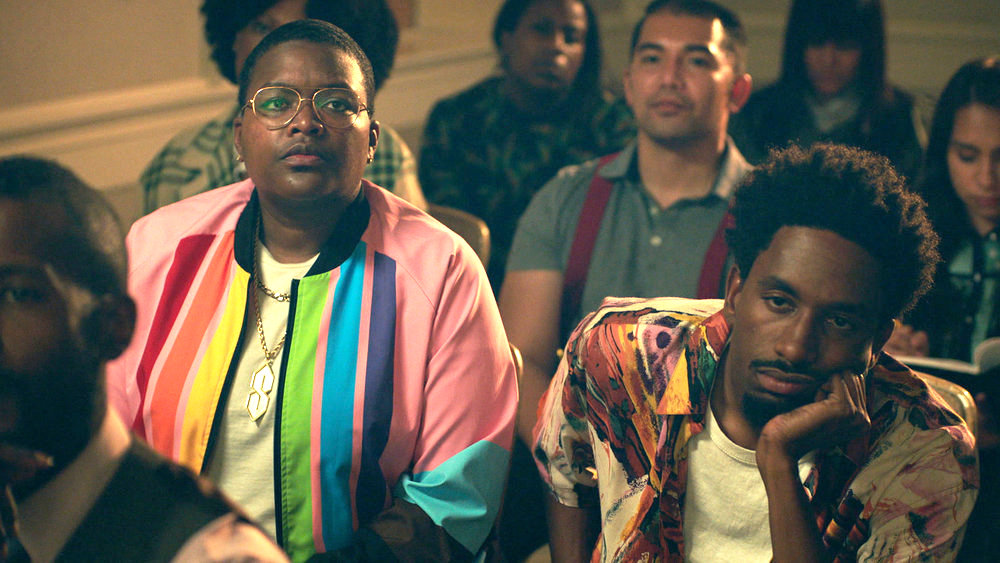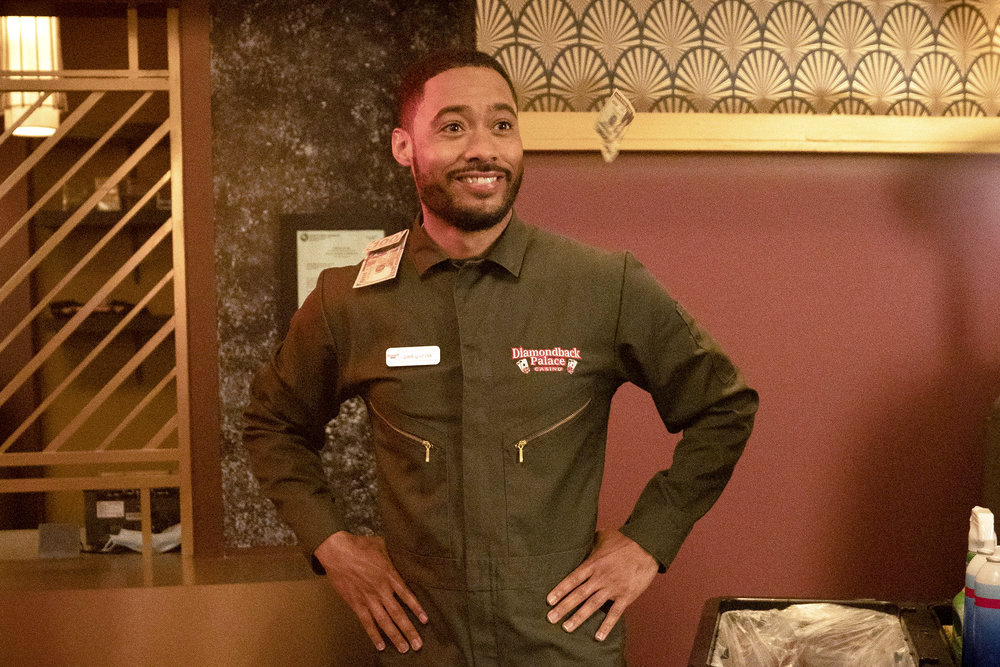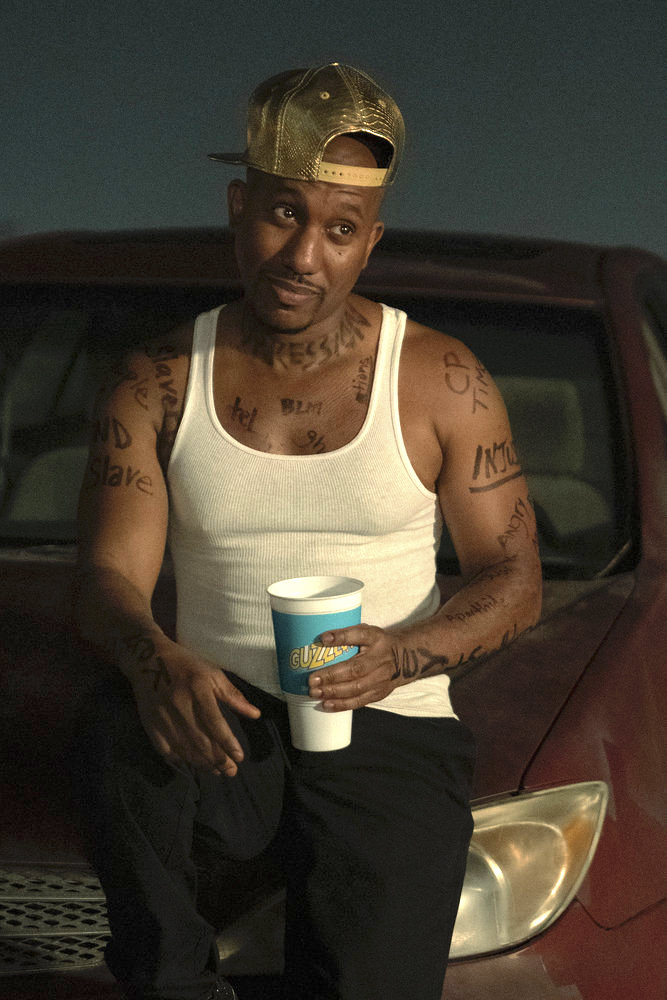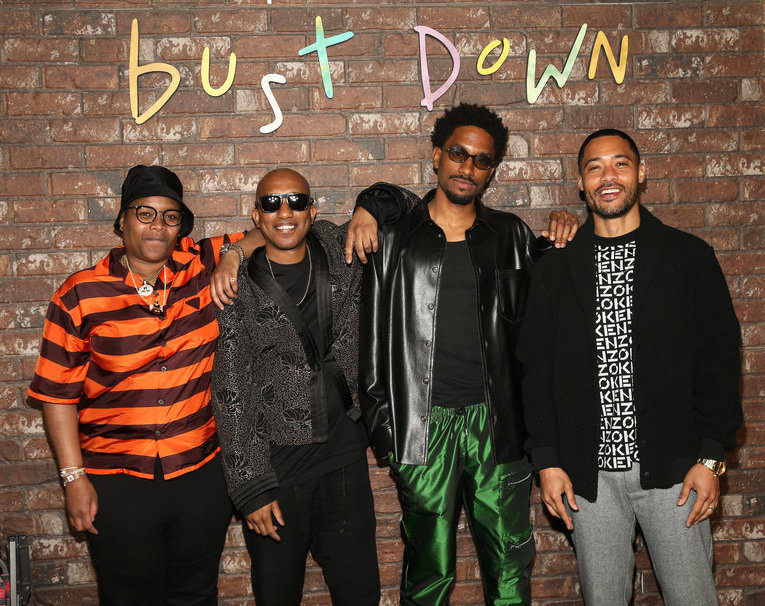“I met with a guy and he gave me a show that was terrible,” began Chris Redd. “I went back to my talented friends who don’t do terrible comedy and said, ‘We should make a version of this.’ We kept jamming on that shit and there were four different versions, but it eventually became Bust Down.”
Redd is known for his work on Saturday Night Live, Popstar, and Joker. His “talented” friends include Sam Jay (SNL, PAUSE with Sam Jay), Langston Kerman (South Side, Insecure), and Jak Knight (Big Mouth, Black-ish).
Bust Down, a Peacock original that follows four casino employees in a dead-end job in middle America who want to find self-worth within their bad ideas. “This show, in a beautiful way, has also tracked our evolution as artists,” said Langston. “What would have been the show, years ago, would have been real bad. Now it’s pretty good.”
Combining comedy styles from shows like South Side, SNL, Big Mouth, and everything in between the writers found their own unique tone in Bust Down. “I think we all just had to go learn our own voices. There was so much we didn’t know outside of being funny people,” said Jak. “We all came back with different levels of information.”
Beyond the Jokes
“In the beginning, we were really just focused on the jokes,” said Langston. “It was just us thinking about the funniest thing a character could do, but if you don’t have a story that grounds that character, it becomes nonsense.”
Sam added, “The more we learned our voice and how to do it, being at SNL I learned how to put my comedic voice in another box, so the more we got proficient at that, the easier it was to form story and think about the arcs of these characters and how to bring them to a series.”
The combined writing process led to the new tone. “I think going to these different edges of comedy, we learned every side of where comedy is currently and came back with different super powers. If we had made the show earlier, we probably would have made four similar characters.”

Sam Jay & Jak Night
“Having to produce your sketches, you also get these strengths behind the camera, just being on set long hours and keeping the energy up,” said Chris. “Or, just those production decisions. I got to see my friends strong in other ways. We knew our way around a set.”
“The energy on set was just Chris,” joked Jak. “Don’t let him lie. Me, Sam and Langston were just quietly reading our scripts.”
The Comedic Landscape
The writers said today’s comedy landscape ebbs and flowers. Langston said, “There are times when there’s a lot of straight comedy and then we hit a window where everything was a dramedy with a message on the back of it. We hope to re-introduce hard comedy and jokes.”
“We’re aware [of other shows]. I don’t like to use the word competing,” said Sam. “Everyone is going to do their thing. We definitely don’t want to step in lanes that are already paved by somebody else. We want to make something unique in the space, so you need to know what’s out there and what’s going on.”
“Fortunately, a lot of people making good comedy are our friends,” added Jak, “so outside of not wanting to make something like something else, we don’t want to steal from our friends.”
Underneath the plot of four people working in a casino, the themes can be described as “messy.” Langston said, “It’s what everybody’s life is. Rarely are conversations life changing for individuals who are having them.”

Langston Kerman. Photo by Isabella Vosmikova/ Peacock)
“You talk with your friends, then you go back to work. We wanted to reflect that rather than this thing Hollywood does which is trying to solve everybody’s problems and make everyone feel safe. We ain’t offering none of that. We have our opinions, then do some silly shit afterwards.”
Niche Comedy
“There’s so much black shit out that now we can be niche,” said Jak. “I can’t believe I’m saying that, but it’s awesome to have an absurd black comedy on TV. I used to watch so much mature white shit that I can’t even imagine what a 15-year-old Jak would do if he saw Bust Down.”
Beyond themes and plot, the writers also spent a lot of time discussing world building and taking the show in different directions. “That was definitely on our minds, especially as we were building it. It’s written intentionally where we can keep building and adding. It’s perfectly open-ended where we can add any absurd thing and it makes sense,” said Sam.
“It’s too late for limits,” added Chris about the series in today’s culture. With no limits and a lean towards the absurd, the writers also make sure the funniest line always makes it to the page. There’s no room for ego. It’s all about the screenplay.
“We have the good fortune of having so many good writers that even if something makes us laugh, it still has to go through the wall of Emmy Blotnick, Zack Fox, and Gary Richardson who are all so incredibly funny. Sometimes it works for us, but not for them, so you have to overcome that.”

Chris Redd. Photo by Isabella Vosmikova/ Peacock
“It’s also like a gumbo pot of perspectives,” said Jak. “Out of nowhere, you might hear a Gary Richardson joke like, ‘That bitch looks like she can wash the shit out of a car’ and only he can say that. That doesn’t make sense, but it makes sense.”
The Pitch
In shows like South Side (interview here), a pitch often requires a sizzle reel. For Bust Down, since the writers all had impressive resumés, the pitch was actually a little simpler. “We are great at riffing with each other, so white people would walk us into a room, let us riff, and that was the show.”
Langston continued, “The challenging part was explaining that those riffs were the show. Explaining that in a professional space. Just because we’re being silly doesn’t mean we don’t have vision and a narrative.”
Sam added, “That was probably the hardest part. We wanted to make a show and people saw the riff and just wanted to put us in a room and do that. We wanted more. We wanted characters. That came back to building ourselves to get clear on the vision.”
“Once we locked in the final version of what the pilot was, we could run in that direction because we figured it out ourselves,” said Chris. Once all of this was laid out, it was time to shape the writers’ room.
The team said they work best when they’re physically in a room together writing and making jokes. “Some of our funnier stuff was definitely built in person,” said Jak. “We would sit on the floor with note cards, say the funniest scenes, and that’s when I think we were at our strongest.”
As for the day to day, every week needed to start with an idea and many of them were spawned from personal experiences that could then be exaggerated for the Bust Down landscape. “Then we would expand that into a story with four different arguments and four different sides to it.”
Misconceptions of Comedy
“Jokes on paper need to be good for the improv to be great,” said Chris. “Without a base to play off of, your improv is saving the show rather than adding to it. I think sometimes people use improv wrong because they either don’t respect the art or don’t know it. You can’t find a better joke if the joke is whack on the paper.”
Thanks to popular blooper reels, this leads to people practicing the craft the wrong way. “There’s also a misconception of how many jokes you need versus how many jokes you want. You can overstuff a scene or a moment with silly gags,” said Langston. “You should really find the best of the best rather than stuff in so many it becomes nonsense.”
“Character arcs matter. Story matters. Sometimes people get so caught up in the joke that they think the jokes are the story. Nah, you still need a story,” said Sam. This led to all of the writers pitching jokes within the narrative, rather than simply the funniest thing they could think of in the moment.
“The final draft is the edit. Don’t think any joke you’re putting in the script is the final joke. The best writing is done in editing. Always try to make the funniest possible thing and if your editors are good, the joke will be better.”
As for advice for novice comedy writers, all of the writers provided different bits of wisdom. Langston said, “Hone what you do and find people to amplify that.” Jak said, “Be friends with people that are funnier than you.” Chris said, “Have patience with your process and don’t listen to nay-sayers.” Sam said, “Create something unique within the comedic space.”
This interview has been condensed. Listen to the full audio version here.

